#new urbanism
Explore tagged Tumblr posts
Text
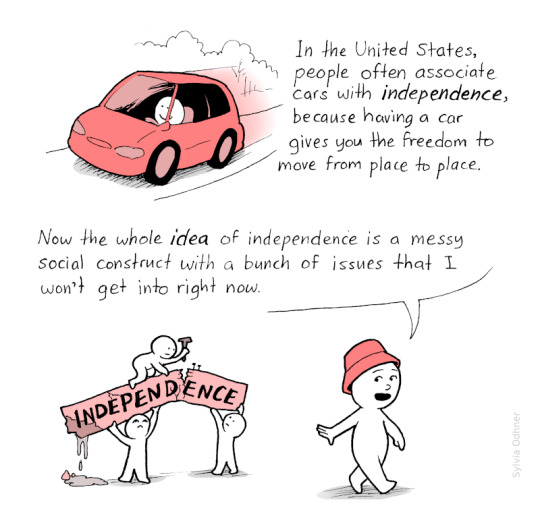
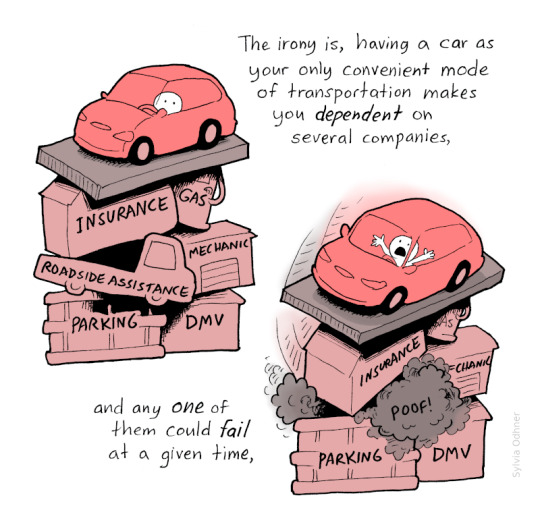
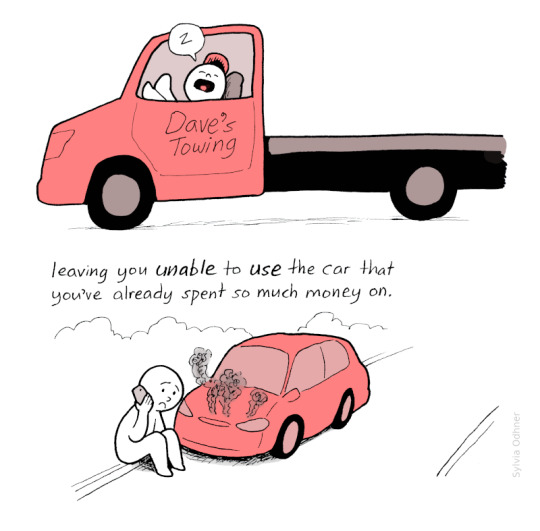
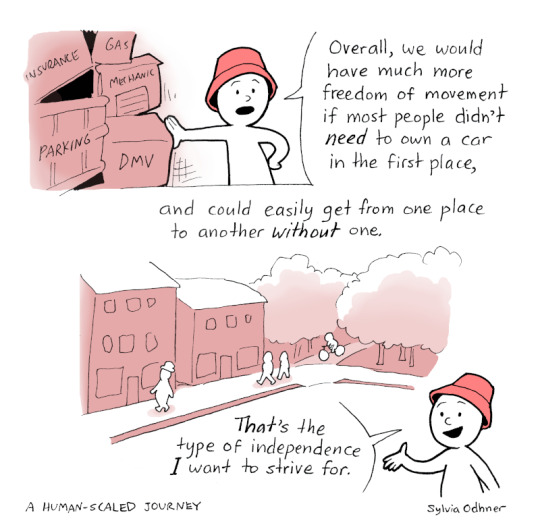
Cars and Independence
My Patreon
Update: This comic has received a lot of both positive and negative attention, and I decided to post a follow-up comic to address some of the criticism: Revisiting Independence
24K notes
·
View notes
Text
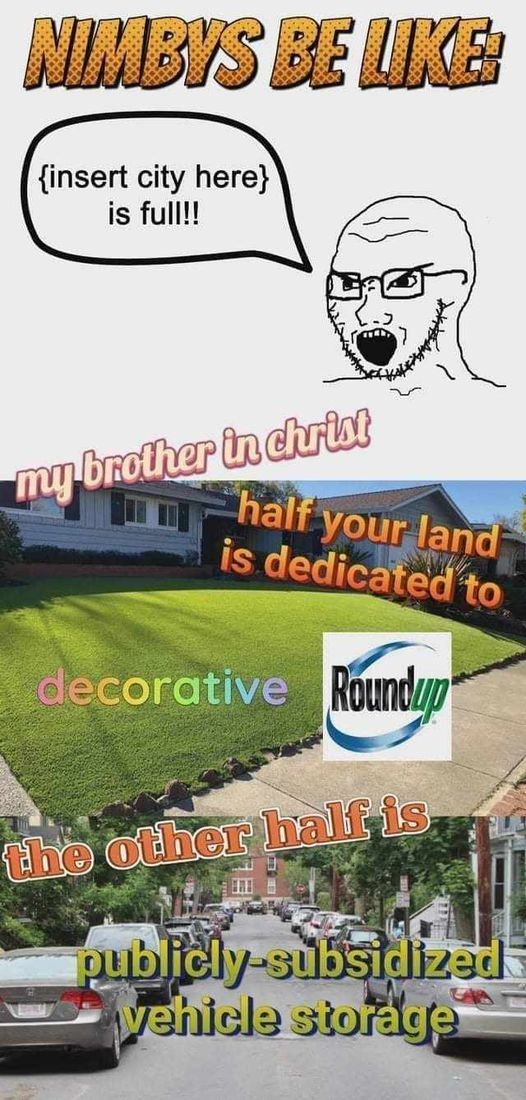
11K notes
·
View notes
Text
Protect the porch
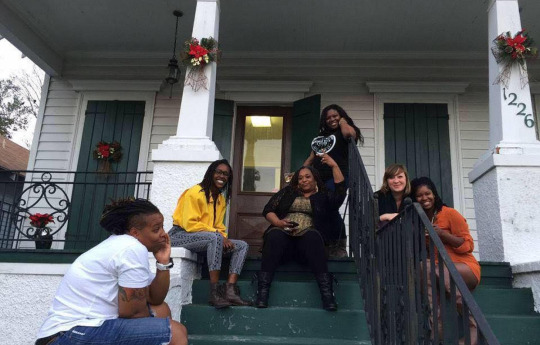
The porch is more than just another single-family architectural feature, it's an important part of the culture of Black neighborhoods. Read more.
78 notes
·
View notes
Text
Late night research: eco-anxiety, solarpunk, new urbanism
54 notes
·
View notes
Text
‘I still hate Chicago’
Chicago:

from an urban design perspective: checks out
reading the street signs: with things that I miss
#boy ep#was everything for the urban design girlies#I didn’t actually mean to put this image of the street signs here I was looking in my archive for suburbia#which apparently is remembered this as#new urbanism#I’m still your boy#luke hemmings
5 notes
·
View notes
Text




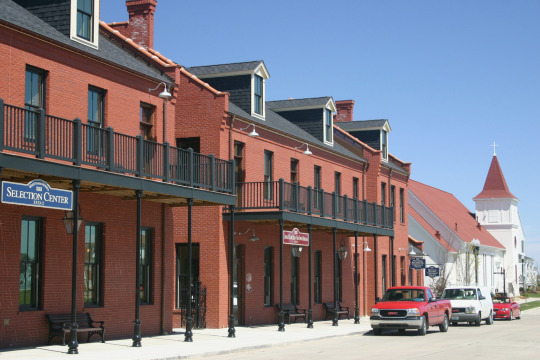




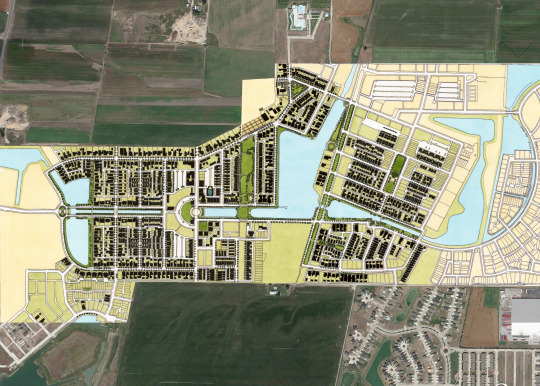
New Town Saint-Charles, Missouri, USA Par : DPZ CoDesign Date : 2002
Projet de 3500 logements en banlieue de Saint-Louis au Missouri. Le projet intègre résidences, commerces et loisirs afin de créer un milieu de vie complet, selon les principes du New Urbanism. Les basins de rétention et de drainage de l'eau sont intégrés avec élgance dans le paysage de la ville.
A projet of 3500 homes in the suburbs of Saint-Louis in Missouri. The project include housing, commerce and recreation, according to the principles of New Urbanism. The retentions ponds needed for the project are integrated into the cityscape elegantly.
Source : https://www.dpz.com/projects/new-town-saint-charles/
#architecture#design#missouri#united states#saint louis#urbanism#urban planning#new urbanism#new classical architecture#classical
2 notes
·
View notes
Text
Howl
And so the wolf howls
perched atop the sprawl,
his path laid out
in roundabouts
and copy paste homes.
No more, he screams.
2 notes
·
View notes
Text
So happy I saw this before starting my essay "Why Cars are a Menace to Society."
64K notes
·
View notes
Text
the things that are reported matters. the language used matters. what is left out of the story matters.
41K notes
·
View notes
Text
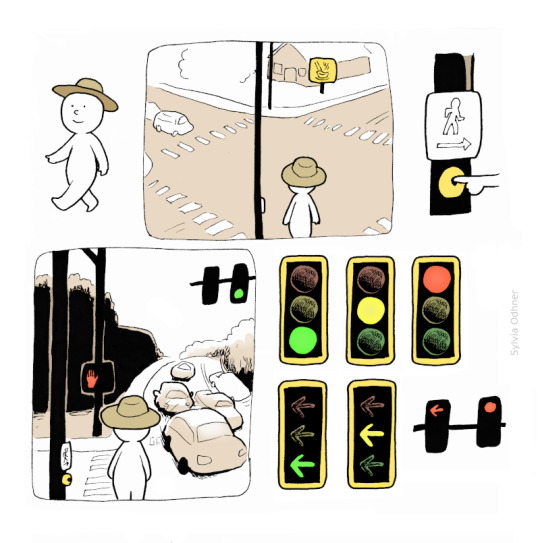
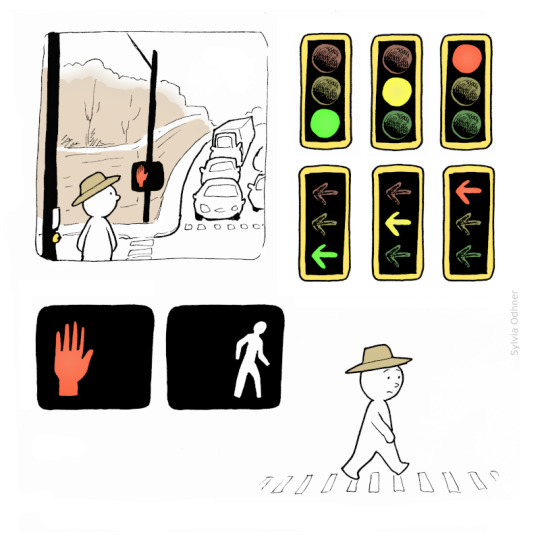
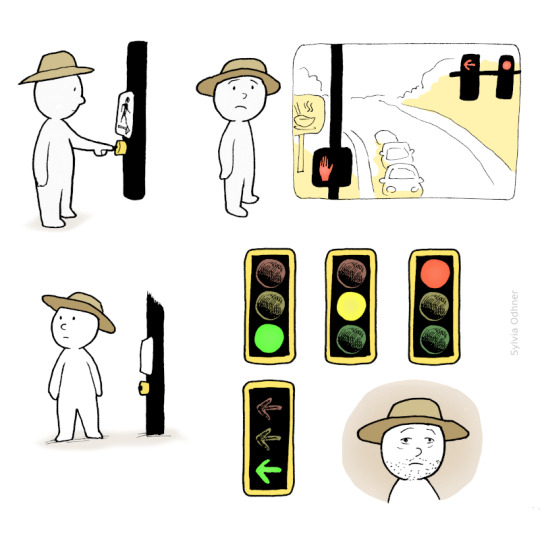
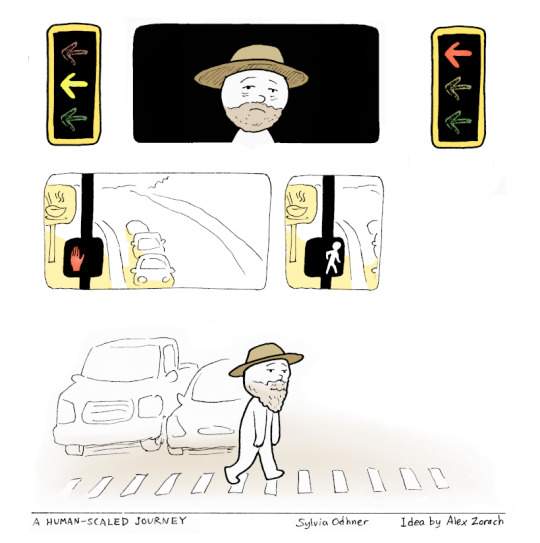
The Walk Light
Does crossing an intersection on foot have to take this long? I think we can do better. My friend Alex Zorach helped me come up with the idea for this one.
66 notes
·
View notes
Text
Also add: the "why would we invest in and improve the bus because only the poors take it" mentality that prevents us all from having a world class transit system in this country!

#public transit#urbanism#cycling infrastructure#classism#inequality has been designed into our cities#it's up to us to fight to make them equal again#disability advocacy#new urbanism#transit#cities
114K notes
·
View notes
Text
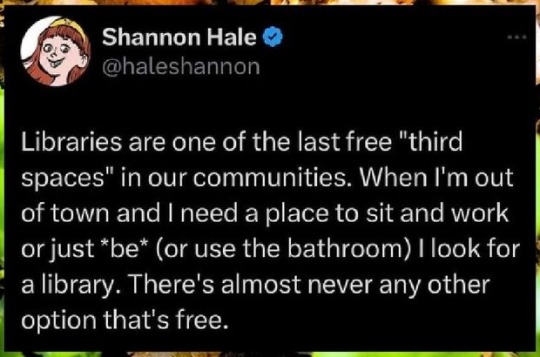
99 notes
·
View notes
Text
Great Idea 7: Tactical urbanism
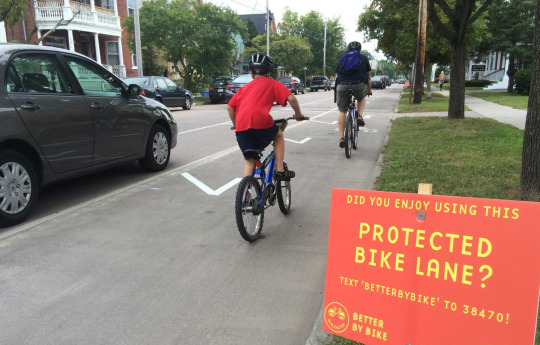
The latest trend in urban design and planning gets them off of the paper and out of a big room, testing ideas in the real world. It is fun and hands-on, and making many converts. Read more.
#great ideas#new urbanism#urban design#urbanism#cities#walkability#bikeable#tactical urbanism#urban planning
36 notes
·
View notes
Text
O combate ao uso do automóvel nas cidades
Barcelona, 2023: via exclusiva para transporte coletivo sobre trilhos. Automóveis foram banidos deste tipo de via Quanto mais o tempo passa, menor fica o espaço social para o automóvel particular nas cidades. Qualquer iniciativa, política ou programa de sustentabilidade urbana que se preze adota ações de desincentivo ao uso do carro para deslocamentos cotidianos. Não há como desenvolver soluções…

View On WordPress
#arquitetura e urbanismo#cidade#cidade sem automóvel#cidade sem carro#cidades#cidades brasileiras#combate ao automóvel#combate ao carro#combate urbano ao carro#desenho urbano#eficiência#faixas exclusivas#faixas exclusivas para ônibus#mobilidade urbana#new urbanism#novo urbanismo#obras viárias#planejamento de transportes#planejamento urbano#planejamento urbano e mobilidade#rejeição ao automóvel#rejeição ao carro#Ricardo Trevisan#solução de transporte#substituto do automóvel#substituto do carro#transporte urbano#urban design#urban plan#urban planning
1 note
·
View note
Text


Pictured: Luis Cassiano is the founder of Teto Verde Favela, a nonprofit that teaches favela residents in Rio de Janeiro, Brazil, how to build their own green roofs as a way to beat the heat. He's photographed at his house, which has a green roof.
Article
"Cassiano is the founder of Teto Verde Favela, a nonprofit that teaches favela residents how to build their own green roofs as a way to beat the heat without overloading electrical grids or spending money on fans and air conditioners. He came across the concept over a decade ago while researching how to make his own home bearable during a particularly scorching summer in Rio.
A method that's been around for thousands of years and that was perfected in Germany in the 1960s and 1970s, green roofs weren't uncommon in more affluent neighborhoods when Cassiano first heard about them. But in Rio's more than 1,000 low-income favelas, their high cost and heavy weight meant they weren't even considered a possibility.
That is, until Cassiano decided to team up with a civil engineer who was looking at green roofs as part of his doctoral thesis to figure out a way to make them both safe and affordable for favela residents. Over the next 10 years, his nonprofit was born and green roofs started popping up around the Parque Arará community, on everything from homes and day care centers, to bus stops and food trucks.
When Gomes da Silva heard the story of Teto Verde Favela, he decided then and there that he wanted his home to be the group's next project, not just to cool his own home, but to spread the word to his neighbors about how green roofs could benefit their community and others like it.
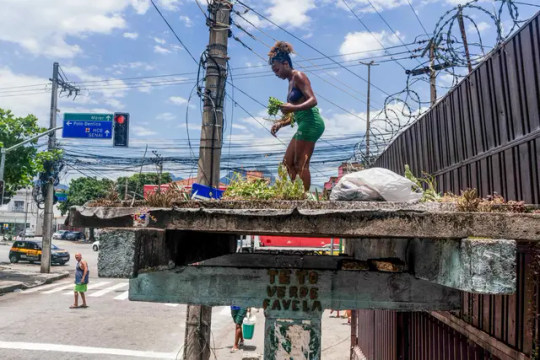
Pictured: Jessica Tapre repairs a green roof in a bus stop in Benfica, Rio de Janeiro, Brazil.
Relief for a heat island
Like many low-income urban communities, Parque Arará is considered a heat island, an area without greenery that is more likely to suffer from extreme heat. A 2015 study from the Federal Rural University of Rio de Janeiro showed a 36-degree difference in land surface temperatures between the city's warmest neighborhoods and nearby vegetated areas. It also found that land surface temperatures in Rio's heat islands had increased by 3 degrees over the previous decade.
That kind of extreme heat can weigh heavily on human health, causing increased rates of dehydration and heat stroke; exacerbating chronic health conditions, like respiratory disorders; impacting brain function; and, ultimately, leading to death.
But with green roofs, less heat is absorbed than with other low-cost roofing materials common in favelas, such as asbestos tiles and corrugated steel sheets, which conduct extreme heat. The sustainable infrastructure also allows for evapotranspiration, a process in which plant roots absorb water and release it as vapor through their leaves, cooling the air in a similar way as sweating does for humans.
The plant-covered roofs can also dampen noise pollution, improve building energy efficiency, prevent flooding by reducing storm water runoff and ease anxiety.
"Just being able to see the greenery is good for mental health," says Marcelo Kozmhinsky, an agronomic engineer in Recife who specializes in sustainable landscaping. "Green roofs have so many positive effects on overall well-being and can be built to so many different specifications. There really are endless possibilities.""
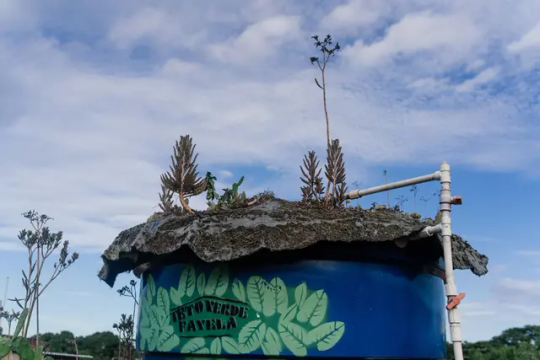
Pictured: Summer heat has been known to melt water tanks during the summer in Rio, which runs from December to March. Pictured is the water tank at Luis Cassiano's house. He covered the tank with bidim, a lightweight material conducive for plantings that will keep things cool.
A lightweight solution
But the several layers required for traditional green roofs — each with its own purpose, like insulation or drainage — can make them quite heavy.
For favelas like Parque Arará, that can be a problem.
"When the elite build, they plan," says Cassiano. "They already consider putting green roofs on new buildings, and old buildings are built to code. But not in the favela. Everything here is low-cost and goes up any way it can."
Without the oversight of engineers or architects, and made with everything from wood scraps and daub, to bricks and cinder blocks, construction in favelas can't necessarily bear the weight of all the layers of a conventional green roof.
That's where the bidim comes in. Lightweight and conducive to plant growth — the roofs are hydroponic, so no soil is needed — it was the perfect material to make green roofs possible in Parque Arará. (Cassiano reiterates that safety comes first with any green roof he helps build. An engineer or architect is always consulted before Teto Verde Favela starts a project.)
And it was cheap. Because of the bidim and the vinyl sheets used as waterproof screening (as opposed to the traditional asphalt blanket), Cassiano's green roofs cost just 5 Brazilian reais, or $1, per square foot. A conventional green roof can cost as much as 53 Brazilian reais, or $11, for the same amount of space.
"It's about making something that has such important health and social benefits possible for everyone," says Ananda Stroke, an environmental engineering student at the Federal University of Rio de Janeiro who volunteers with Teto Verde Favela. "Everyone deserves to have access to green roofs, especially people who live in heat islands. They're the ones who need them the most." ...
It hasn't been long since Cassiano and the volunteers helped put the green roof on his house, but he can already feel the difference. It's similar, says Gomes da Silva, to the green roof-covered moto-taxi stand where he sometimes waits for a ride.
"It used to be unbearable when it was really hot out," he says. "But now it's cool enough that I can relax. Now I can breathe again."
-via NPR, January 25, 2025
#architecture#sustainable architecture#heat islands#urban heat#brazil#brasil#south america#favela#rio de janeiro#green roof#plants#climate action#climate adaptation#infrastructure#good news#hope#solarpunk
4K notes
·
View notes
